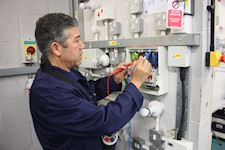Pearson BTEC Level 4 HNC in Engineering (Electrical and Electronic Engineering) Part-Time
Part Time Day - year 1 of a 2 year course
West London Institute of Technology, Led by HCUC (Harrow College & Uxbridge College)
Summary
- Tutor is available to students
Location & dates
Park Road
Uxbridge
Middlesex
UB81NQ
United Kingdom
Overview
This two-year course is suitable for young, mature adults seeing to reskill/upskill in the engineering sector.
Qualification
Pearson BTEC Level 4 Higher National Certificate in Engineering
Course media
Description
Course Content
In this two-year course, students develop a broad knowledge and awareness of key aspects of the engineering sector by studying level 4 units. The Level-4 HNC course has three different pathways, Electrical, Electronics, and Automation Control & Robotics engineering pathways. Each pathway has 5 mandatory units out of which four are core units including one unit assessed by a Pearson-set assignment and two are specialist units. In addition to mandatory units, there are three additional specialist units for each Pathway. All units in HNC are 15 credit units.
Core Units (Mandatory)
- Engineering Design (Yearly-2)
- Engineering Maths (Yearly-1)
- Engineering Science (Yearly-1)
- Managing a Professional Engineering Project (Pearson-set) (Yearly-2)
Specialist Units (Mandatory)
- Electrical and Electronic Principles (Yearly-1)
Additional Specialist units: Electrical
- Automation, Robotics and Programmable Logic Controllers (PLCs) (Yearly-2)
- Electrical Systems and Fault Finding (Yearly-2)
- Digital Principles (Yearly-1)
- Automation Control & robotics
- Mechatronics (Yearly-1)
- Automation, Robotics and Programmable Logic Control-lers (PLCs) (Yearly-2)
- Electrical Systems and Fault Finding (Yearly-2)
Electronics
- Electrical Machines (Yearly-2)
- Digital Principles (Yearly-1)
- Electronic Circuits and Devices (Yearly-2)
Study Methods
Mix of theory by lectures/teaching (70%), practical demonstrations/workshops (25%), tutorials/virtual learning environments (2%), guest speakers and field trips (3%) with 15 contact hours per week over 32 weeks during academic year. Student are expected to complete approximately 90 hours per unit for each 15 credit unit of independent study (i.e. on research and completing assignments) and unsupervised form of learning (e.g. e-learning, e-assessment, coursework, work-based learning, etc.).
How is the course assessed
Assessment is through a series of time-constrained written assignments which involve design projects, practical, simulation, posters, logbooks and presentations and tests (10%).
Requirements
An A Level in Maths/Physics/Engineering grade C or above, or BTEC L3 Diploma with MP grade or BTEC L3 Extended Diploma with MPP grade in Electrical and Electronic Engineering plus merit or above in: Maths for Engineering Technicians or international equivalent. Students with L3 qualification in an engineering discipline with industrial experience may be considered. You will have GCSE grade A*-C (grade 9-4) in English, Maths, & Science.
Non-native English speakers who have not undertaken their final 2 years of schooling in English must demonstrate capability a standard equivalent to IELTS 5.5; Reading & Writing must be at 5.5.
Career path
The skills offered as part of the Pearson BTEC Higher National Certificate can provide graduates with the opportunity to work in many different areas of the Engineering sector. Previous students have successfully gained employment in the following roles: production engineer, design engineer, project engineering, installation and commissioning, maintenance engineer, technical sales/trainers.
Questions and answers
Reviews
Currently there are no reviews for this course. Be the first to leave a review.
Legal information
This course is advertised on reed.co.uk by the Course Provider, whose terms and conditions apply. Purchases are made directly from the Course Provider, and as such, content and materials are supplied by the Course Provider directly. Reed is acting as agent and not reseller in relation to this course. Reed's only responsibility is to facilitate your payment for the course. It is your responsibility to review and agree to the Course Provider's terms and conditions and satisfy yourself as to the suitability of the course you intend to purchase. Reed will not have any responsibility for the content of the course and/or associated materials.



